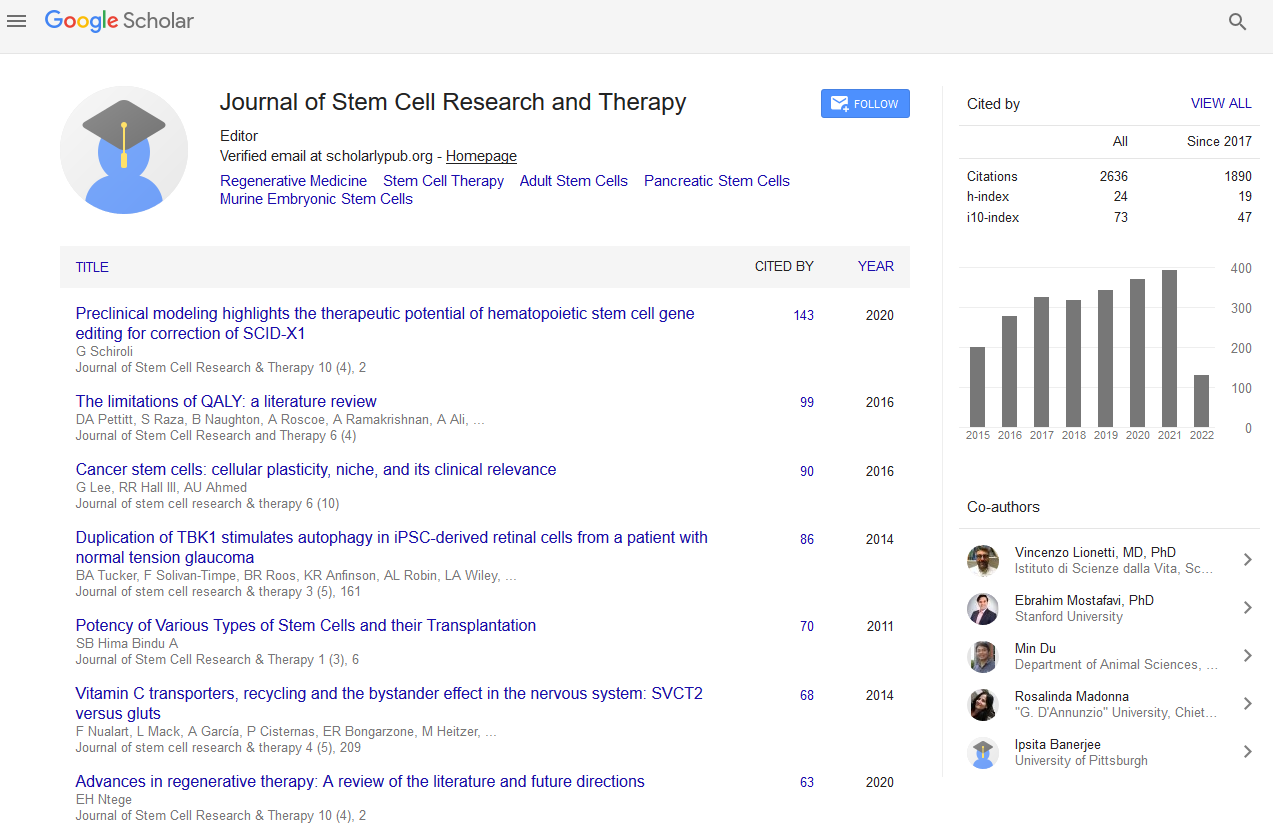Indexed In
- Open J Gate
- Genamics JournalSeek
- Academic Keys
- JournalTOCs
- China National Knowledge Infrastructure (CNKI)
- Ulrich's Periodicals Directory
- RefSeek
- Hamdard University
- EBSCO A-Z
- Directory of Abstract Indexing for Journals
- OCLC- WorldCat
- Publons
- Geneva Foundation for Medical Education and Research
- Euro Pub
- Google Scholar
Useful Links
Share This Page
Journal Flyer

Open Access Journals
- Agri and Aquaculture
- Biochemistry
- Bioinformatics & Systems Biology
- Business & Management
- Chemistry
- Clinical Sciences
- Engineering
- Food & Nutrition
- General Science
- Genetics & Molecular Biology
- Immunology & Microbiology
- Medical Sciences
- Neuroscience & Psychology
- Nursing & Health Care
- Pharmaceutical Sciences
Impact of intracerebrally implanted Cx30 transfected C6 cells in mediating glial tumorigenecity in rats
3rd International Conference and Exhibition on Cell & Gene Therapy
October 27-29, 2014 Embassy Suites Las Vegas, USA
A J Vanisree
Scientific Tracks Abstracts: J Stem Cell Res Ther
Abstract:
Connexin 30 is highly expressed in mammalian brain and is more pronounced during the embryonic stage which eventually declines as the animal ages. Till date a strong debate exists on the role of connexins which have been shown to augment tumor growth and also to inhibit the growth. The study attempts to find the impact of connexin 30 (Cx 30) in vivo, which was proved only by a couple of studies (in vitro), to inhibit the tumor augmentation in glioma, as it is well known that the behavior of gene in vivo and in vitro would vary significantly. The study included rats which were implanted with either Cx30 transfected (stably) or non-transfected C6 cells and were assessed for tumor induction. Colony formation and single cell colony assay of the transfected cells and non-transfected cells were performed before implantation. Survival curve was assessed followed by the expressional studies of CD 133, cyclin D, c-myc, in addition to Akt, PI3K and PGE2 which are critically involved in glial tumor cell proliferation and aggressiveness. Colony and single cell assay showed a comparative reduction in the colony forming efficiency of the transfected cells. The mortality rate of rats with implanted non-transfected cells was high when compared to that of transfected animals. The expression of regulatory and aggressive factors had revealed that Cx30 could exhibit a significant effect on in vivo aggressiveness of glioma. Though the observations could not be attributed to Cx30 channel dependent and/or independent impact, they stress the significance of Cx30 in glial tumor growth.
Biography :
A J Vanisree, Assistant Professor in Biochemistry, University of Madras completed her PhD (2000) in the field of lung cancer. Her Post-doctoral works revolved in the area of gene synteny and immunosuppressants in the reputed labs in her home town. After joining University of Madras in 2004, her research interests were focused in the arena of neuro-oncology and neurodegeneration. She had guided more than 8 students for their PhD and 30 MPhil degree candidates. She has more than 25 national and international publications in peer reviewed journals. She also had refereed research articles in reputed journals. Her research findings are presented by her as invited talks in many national and international conferences. She has funded grants from ICMR, DST and consultancy projects.


